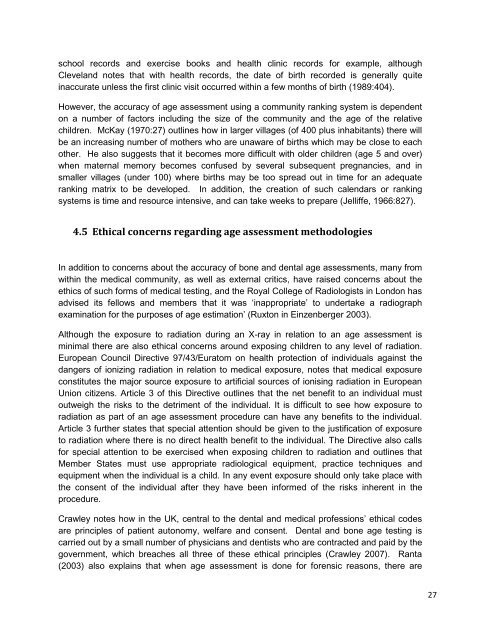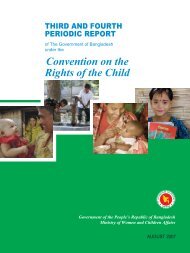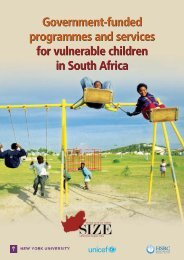Age assessment practices: a literature review & annotated ... - Unicef
Age assessment practices: a literature review & annotated ... - Unicef
Age assessment practices: a literature review & annotated ... - Unicef
You also want an ePaper? Increase the reach of your titles
YUMPU automatically turns print PDFs into web optimized ePapers that Google loves.
school records and exercise books and health clinic records for example, although<br />
Cleveland notes that with health records, the date of birth recorded is generally quite<br />
inaccurate unless the first clinic visit occurred within a few months of birth (1989:404).<br />
However, the accuracy of age <strong>assessment</strong> using a community ranking system is dependent<br />
on a number of factors including the size of the community and the age of the relative<br />
children. McKay (1970:27) outlines how in larger villages (of 400 plus inhabitants) there will<br />
be an increasing number of mothers who are unaware of births which may be close to each<br />
other. He also suggests that it becomes more difficult with older children (age 5 and over)<br />
when maternal memory becomes confused by several subsequent pregnancies, and in<br />
smaller villages (under 100) where births may be too spread out in time for an adequate<br />
ranking matrix to be developed. In addition, the creation of such calendars or ranking<br />
systems is time and resource intensive, and can take weeks to prepare (Jelliffe, 1966:827).<br />
4.5 Ethical concerns regarding age <strong>assessment</strong> methodologies<br />
In addition to concerns about the accuracy of bone and dental age <strong>assessment</strong>s, many from<br />
within the medical community, as well as external critics, have raised concerns about the<br />
ethics of such forms of medical testing, and the Royal College of Radiologists in London has<br />
advised its fellows and members that it was „inappropriate‟ to undertake a radiograph<br />
examination for the purposes of age estimation‟ (Ruxton in Einzenberger 2003).<br />
Although the exposure to radiation during an X-ray in relation to an age <strong>assessment</strong> is<br />
minimal there are also ethical concerns around exposing children to any level of radiation.<br />
European Council Directive 97/43/Euratom on health protection of individuals against the<br />
dangers of ionizing radiation in relation to medical exposure, notes that medical exposure<br />
constitutes the major source exposure to artificial sources of ionising radiation in European<br />
Union citizens. Article 3 of this Directive outlines that the net benefit to an individual must<br />
outweigh the risks to the detriment of the individual. It is difficult to see how exposure to<br />
radiation as part of an age <strong>assessment</strong> procedure can have any benefits to the individual.<br />
Article 3 further states that special attention should be given to the justification of exposure<br />
to radiation where there is no direct health benefit to the individual. The Directive also calls<br />
for special attention to be exercised when exposing children to radiation and outlines that<br />
Member States must use appropriate radiological equipment, practice techniques and<br />
equipment when the individual is a child. In any event exposure should only take place with<br />
the consent of the individual after they have been informed of the risks inherent in the<br />
procedure.<br />
Crawley notes how in the UK, central to the dental and medical professions‟ ethical codes<br />
are principles of patient autonomy, welfare and consent. Dental and bone age testing is<br />
carried out by a small number of physicians and dentists who are contracted and paid by the<br />
government, which breaches all three of these ethical principles (Crawley 2007). Ranta<br />
(2003) also explains that when age <strong>assessment</strong> is done for forensic reasons, there are<br />
27
















